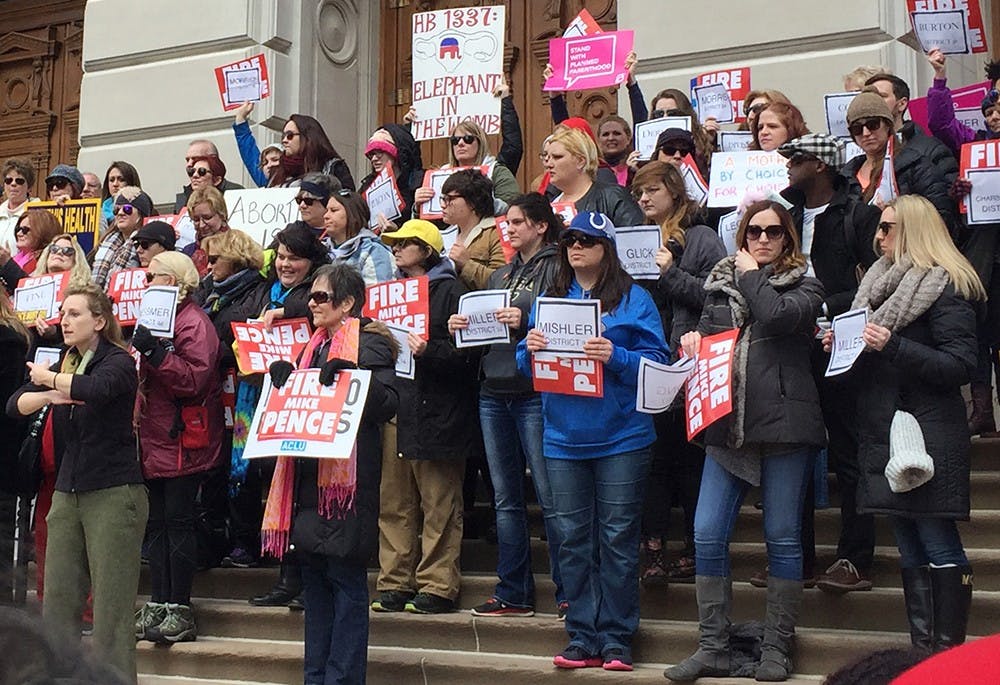Backlash mounted through the weekend over a restrictive abortion law signed by Gov. Mike Pence. A phone campaign intended to provide the governor’s office with the gritty details of women’s menstrual cycles swelled as more than 1,000 protesters gathered at the steps of the Indiana statehouse to call for Pence’s resignation.
IU law professor Dawn Johnsen said Monday the legislation is a political effort intended to trivialize the reasons women get abortions and to “put a cloud over conversations between a woman and her doctor.”
“I absolutely think both RFRA and this draconian abortion law are huge embarrassments to the state of Indiana,” said Johnsen, who from 1997 to 1998 served as acting assistant attorney general in the United States Office of Legal Counsel. “They both violate rights and discriminate against groups of Hoosiers in ways that are regressive.”
Though the bill passed with comfortable majorities in the General Assembly and was signed by Gov. Mike Pence on March 24, opponents have said the law, along with the Religious Freedom Restoration Act legislation signed last year, tarnishes the state’s image.
Louise Melling, deputy legal director for the American Civil Liberties Union, traveled to Bloomington to speak at the Maurer School of Law on Tuesday regarding House Enrolled Act 1337, which, among other restrictions, bans abortions sought if the fetus has a disability and requires that women cremate or bury fetal remains.
Annette Gross, the organizer of the Saturday protest on the statehouse lawn, likened the bill to RFRA.
“It’s another attack on a group of people,” Gross said. “They’re peeling away, group after group.”
RFRA, which was intended to prohibit the government from placing burdens on a person’s ability to practice his or her religion, was heavily criticized by those concerned the law would allow discrimination based on sexual orientation. The law cost Indianapolis $60 million in tourism revenue, according to the tourism group Visit Indy.
Soon after Pence signed the abortion bill, Planned Parenthood of Indiana and Kentucky and the Indiana chapter of the ACLU filed a lawsuit requesting a preliminary injunction, which would prevent the law from taking effect.
“Governor Pence has every confidence this law is constitutional,” Kara Brooks, the governor’s press secretary, said in a statement Monday. “We will work with the Attorney General to defend the law that enhances information expectant mothers receive and enhances protection for the unborn.”
Pence, who signed the abortion legislation into law less than a year after signing RFRA, is inserting his religious ideology into state law, said Ali Slocum, communications director for Planned Parenthood of Indiana and Kentucky.
“It is time for him to grasp that he has myriad constituencies who do not subscribe to his religious beliefs and personal values,” Slocum said in a statement.
Melling’s speech will argue refusing to provide women reproductive healthcare is as much discrimination as denying the LGBT community wedding services, according to an event promotion.
She said the provision in HEA 1337 requiring fetal remains be cremated or buried is not common in other states.
“Indiana is unusual in that respect,” she said.
At the rally Saturday afternoon, repeated chants to “vote Pence out” could be heard from a block away. Many protesters carried signs sporting slogans like, “Jesus isn’t a dick, so get him out of my vagina,” and “Not the bondage I’m looking for.”
Volunteers urged rally-goers not to yell over the speakers, whose voices, muffled and distorted by a megaphone, filled the lawn for about two hours. Young protesters clambered onto each other’s shoulders to block the signs of pro-life activists, many of whose posters depicted images of aborted fetuses.
Opposition to the bill gained momentum in the national media when women began calling government offices and detailing their menstrual cycles in response to a call to action from the Facebook page Periods for Pence.
The page, as of Monday evening, had more than 48,000 likes. Stories about the phone campaign were picked up by national media throughout the past week. Pence’s office declined to comment on the movement further.
Standing near the steps to the statehouse, two women argued over abortion while wary police officers looked on.
“Cancer rates go up by 44 percent when you get an abortion,” the first woman said.
The second, Jennifer Sutton, held up a coat hanger, intended as a symbol for coat hanger abortions, while the two argued.
After their argument, Sutton said she recently moved back to her home state of Indiana after living in Chicago and Newark, New Jersey. She said voting Republican is not out of the question for her, but called HEA 1337 “disturbing.” She expressed concern that Indiana would lose business advantages as a result of the law.
“I think that other states just think that we’re on the wrong side of history,” Sutton said. “They think we’re a state full of backward rednecks, and we aren’t.”
Gross, the protest organizer, took issue particularly with the provision in the law that aborted fetuses must be buried or cremated.
“My husband and I had to bury a full-term baby that died,” Gross said. “I can tell you that burying a child is the most horrible thing in the world. To force a woman to bury fetal remains is so heartless and mean — they have no idea what it’s like. That alone is wicked.”






